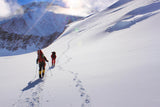Mind Over Matter: Building Mental Fortitude in the Mountains

(Words and Photos: Morgan Nankivell)
It’s a muggy June morning, and you're faced with a rocky trail, slippery with dew, and you’ve just ascended the steepest section of the hike. You’re almost at the summit, and the chill in the air warns you of the rain in the forecast. Descending in the rain sounds like a bad idea, but you trust your gut and move forward. After ascending, the clouds rolling in and the humidity thickening as you duck below tree line, you begin the quad-busting descent. After 7 miles of brutality, you know you’re on the back half, but have 3 more to go. And you know what? You feel so strong, like a freight train destined to crush this goal you have set for yourself. Nothing can stop you – you’ve reached the ultimate mind over matter groove.
That’s how I felt on a recent hike in Pemigewasset Wilderness in the White Mountains of New Hampshire, and to be totally honest, it is a feeling I am just getting used to. When I began hiking, even short trails seemed to last forever. Often times, the struggle would get to me and I would be left feeling that something was missing.

To overcome this feeling, I was keen on finding any tips and tricks to hike with less of the anguish I experienced during my first outings. Looking up things like “easiest hikes in the Whites”, “best day hikes”, and “leg exercise for hiking” were frequent searches, and there was plenty of advice to be consumed. Step ups, lunges, split squats and cardio became my friend (albeit reluctantly), and I was determined to step up my game and get to understanding this type two fun a little more. I wanted to be like the blissed-out hikers who passed me with wide, knowing grins on their faces.
Well, I quickly learned as most do, that physical progress is not linear, and each hike possesses very different challenges. I was feeling strong some days, and not-so-strong others. Not only that, but not matter how much I ran, walked, and stair climbed, the miles still felt agonizing. Yes, I was faster, and yes, I was pushing my boundaries a little more each time, but why did every step still feel like torture? There was no way I was going to accomplish my goals if I couldn’t feel confident on something I imagined should be “easy”.

Then one day I set out on a trip I never expected would be as difficult as it turned out to be. I was standing on the steep, snowy trail up Cannon Mountain on my rented snowshoes, the loose unpacked powder slipping away from under my feet. Every energy-sucking step I took in the frigid air was like one of those dreams where your legs just don’t quite let you run, and I would slide back down the steep incline a little further back than I had started. My hiking partner and I had already broken trail in hip-depth snow for several hours, and I was at the end of my rope. The icy scrambles that followed involved the ice axe and this unnerved me – I didn’t feel confident in my steps, and it took me ages to muster up the courage to place each foothold. We were leading a pack of fellow hikers that were helping us pack the deep, loose snow, and finally someone behind us offered to go out in the front take over the brunt of the trail breaking. As they passed, one hiker could see the pained look on my face and suggested I take a snack break. I rifled for a Clif bar, and as I devoured the half-frozen peanut butter brick, I realized that I almost certainly had not eaten enough calories for the intense winter hike I had found myself battling through. I kept thinking to myself “why can’t I just do this?”.
Then it finally clicked – this isn’t meant to be easy. Even though most hikers passed us, few people were bounding up the mountain exclaiming how easy it was. I had missed the memo somehow that mental strength would help me persist through the trying physical and psychological moments in these mountains. After being run down on the side of Cannon that day, I could see building my mental strength and fortitude would be the key to getting me through these tough moments and bringing me out of a place a frustration and into a state hiker happiness.

From the lessons that day, and many other days before and since, there are a couple hiking tricks I keep in mind to prepare for long and difficult treks in the mountains.
1. Prioritize Nutrition
One of the common threads in a mentally poor hike is a lack of priority on my nutrition leading up to and during the hike. Low energy and quick muscle fatigue from poor diet choices are an easy way to end up feeling rundown mentally. To avoid this, I make sure to eat and drink plenty the night before. I also choose foods in the morning before the hike with plenty of energy and that are easy on the stomach. Once I realized how much proper fuel not only increased my physical performance but more staggeringly my mood and outlook, it was a game changer.
2. Hike Alone
Going it alone may seem like the opposite of what you need to motivate yourself. While many times hiking buddies provide amazing company and support, I have found solo hikes to be an excellent way to build my mental strength. When hiking alone, any outside pressure or expectation (real or self-imposed) is erased, and there is the opportunity to fall into your own unique rhythm on the trail. Solo hikes also provide an opportunity to develop patience while hiking, which I believe to be one of the most underrated skills essential to mental toughness on the trail. Finally, when the solo hike is completed, I feel I build confidence and assuredness in my own skills. Building this rapport with yourself is key in building mental fortitude.
3. Practice Self-Forgiveness
Most of us put pressure on ourselves to preform to a certain standard, and I have done this countless times on the trail. Ultimately, with this mindset, I end up hiking even slower and feeling pretty defeated in the process. So, when heading out, I remind myself that whatever pace and however difficult it may feel in the moment, it is a journey worth having and I am still working towards my goals. And even if I don’t get it done the way I had imagined or I have to turn back, the mountains will be waiting for me another day.

Hiking can be one of the best ways to challenge ourselves, and although on the surface that challenge may seem primarily physical, the truth is that the greatest challenge exists within our own minds. We can make or break our goals and dreams just by a change in how we think about ourselves and our relation to the mountains. It is crucial that we strengthen our psyches and get down to the meaning of mind over matter. I believe this is integral to fulfillment in our great outdoor adventures.
-
Shop the gear in this post:





